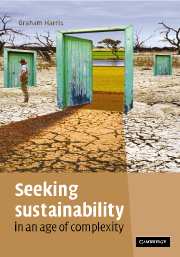Book contents
- Frontmatter
- Contents
- Acknowledgements
- 1 Preamble: the world we are in
- 2 Complexity and complex systems
- 3 New science, new tools, new challenges
- 4 The complexity of ecology
- 5 The generation of complexity
- 6 Micro-interactions and macro-constraints
- 7 A sense of place
- 8 Created landscapes and our changing sense of place
- 9 Catchment form and function
- 10 Catchment loads: ecosystem impacts
- 11 Change detection, monitoring and prediction
- 12 Evidence, uncertainty and risk
- 13 Modified landscapes: biodiversity
- 14 Function in fragmented landscapes
- 15 Environmental flows
- 16 Evidence for global change
- 17 Values and beliefs
- 18 Managing environmental, social and economic systems
- 19 Linking multiple capitals in a changing world
- 20 Community, capacity, collaboration and innovation
- 21 A new environmental paradigm
- 22 Emergent problems and emerging solutions: developing an ‘ecolophysics’?
- 23 Avoiding collapse
- Index
22 - Emergent problems and emerging solutions: developing an ‘ecolophysics’?
Published online by Cambridge University Press: 21 March 2011
- Frontmatter
- Contents
- Acknowledgements
- 1 Preamble: the world we are in
- 2 Complexity and complex systems
- 3 New science, new tools, new challenges
- 4 The complexity of ecology
- 5 The generation of complexity
- 6 Micro-interactions and macro-constraints
- 7 A sense of place
- 8 Created landscapes and our changing sense of place
- 9 Catchment form and function
- 10 Catchment loads: ecosystem impacts
- 11 Change detection, monitoring and prediction
- 12 Evidence, uncertainty and risk
- 13 Modified landscapes: biodiversity
- 14 Function in fragmented landscapes
- 15 Environmental flows
- 16 Evidence for global change
- 17 Values and beliefs
- 18 Managing environmental, social and economic systems
- 19 Linking multiple capitals in a changing world
- 20 Community, capacity, collaboration and innovation
- 21 A new environmental paradigm
- 22 Emergent problems and emerging solutions: developing an ‘ecolophysics’?
- 23 Avoiding collapse
- Index
Summary
So what can we make of the world we are in? Paying attention to pattern and process at small scales, complex valuations and reconciliations.
So the emerging solutions require a new world view. The first, and in my view the most important, change in world view has been the acceptance and understanding of a dynamic, non-linear, non-equilibrium view of complex systems; and the ways in which the actions of biological and social agents working with simple rules based on local information can produce emergent system-level properties. This ‘unruly systemism’ – the action of agents in a recursive context – is a middle ground between the totally reductionist, individualist view and the structuralist view of system dynamics. This view allows for high degrees of non-linearity, surprises and hysteresis effects: precisely what we observe in nature. It is also a way of understanding the behaviour of meso-scale entities, landscapes and waterscapes – but not necessarily being able to predict what is going to happen. This ‘networked’ view of nature seems to show up many consistent patterns associated with scale-free (or ‘small world’) networks, which occur in everything from networks of interacting enzymes in cellular metabolism to social networks across continents. I think Bateson would have been proud to see the ways in which some of his ideas have developed and taken root. Not only are individual people and families best seen in ‘context’ but these concepts have been a powerful ways of exploring and explaining much of what we see around us.
- Type
- Chapter
- Information
- Seeking Sustainability in an Age of Complexity , pp. 309 - 327Publisher: Cambridge University PressPrint publication year: 2007



